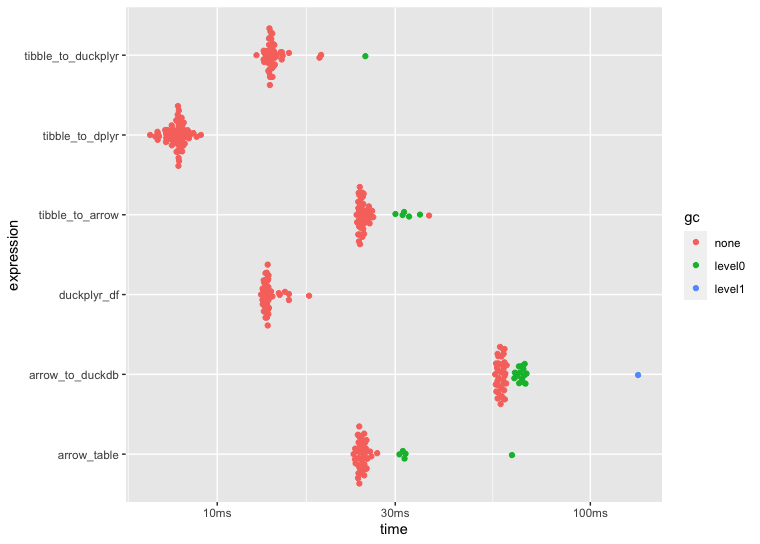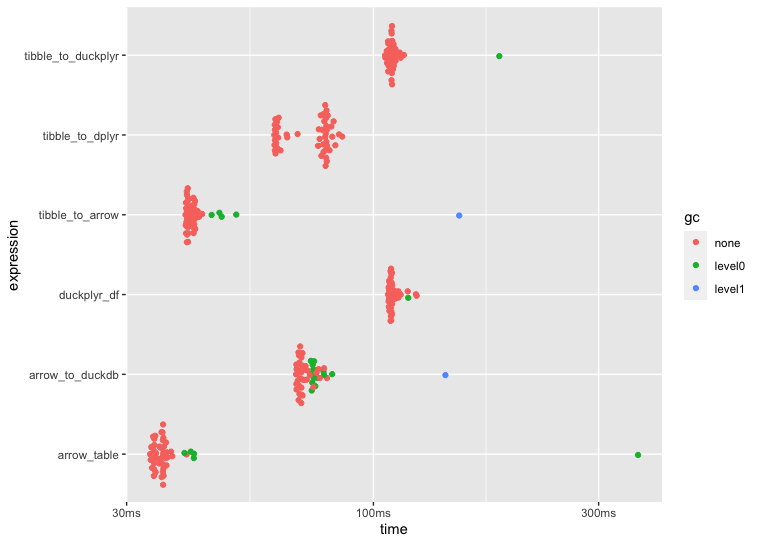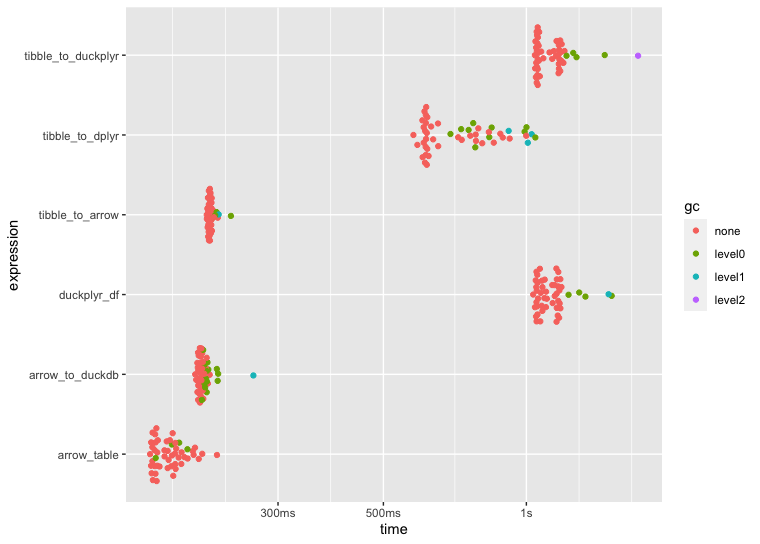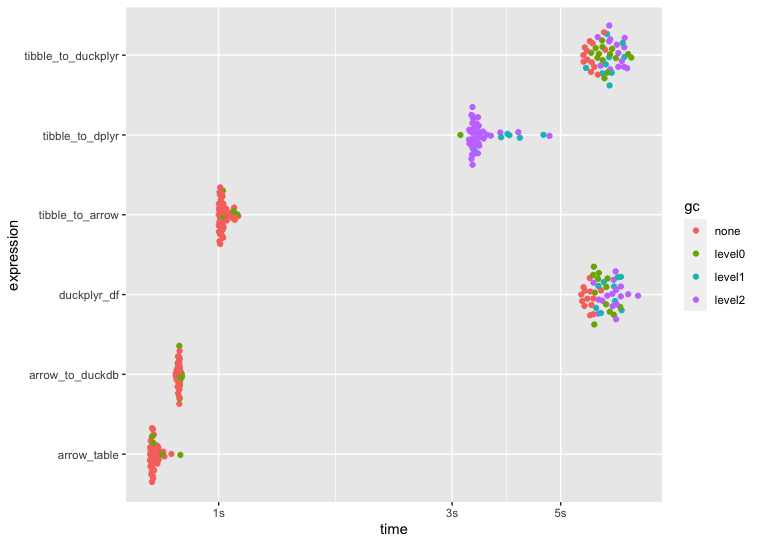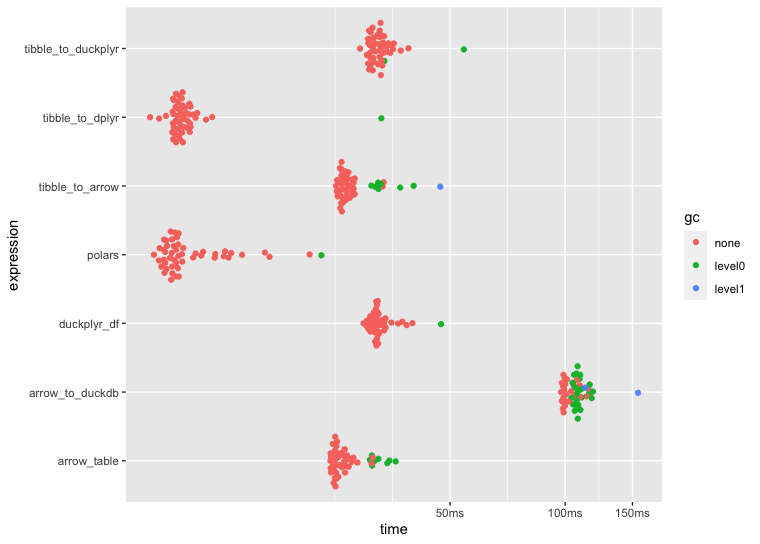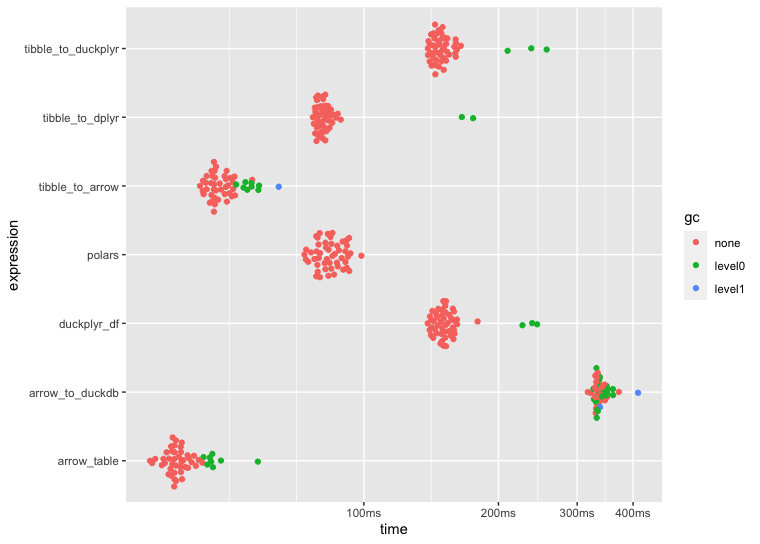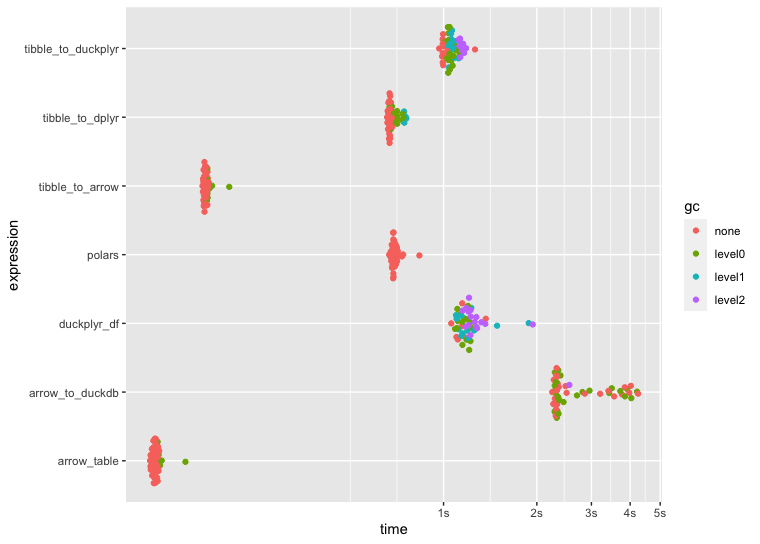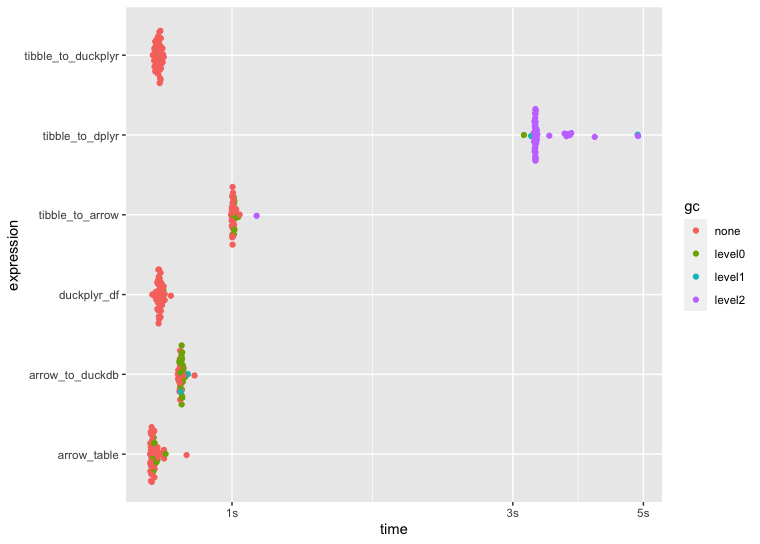[HELP] duckplyr Benchmarking Comparison
Opened this issue · 6 comments
I was at Posit Conf when I learned about duckplyr and this package is awesome! I'm looking forward to developing with it and thanks to the DuckDB Labs team for spearheading this initiative.
I ran some benchmarks to compare speed across a few ETL approaches using dplyr, arrow, duckdb, arrow::to_duckdb(), and duckplyr. I assume the reason for the slower ETL speeds using duckplyr boils down to user error 🙋♂️ but having said that, I'd appreciate any insight if my duckplyr setup and/or application is flawed in some way.
Any pointers would help, thank you! Below is the code that I used to benchmark performance including the plots generated by autoplot(bnch):
# Load Libraries ----------------------------------------------------------
require(here)
library(arrow)
library(dplyr)
library(stringr)
library(tictoc)
library(duckplyr)
library(ggplot2)
# Download Data -----------------------------------------------------------
# Download 40GB (1.1 billion rows) of NYC Taxi rides
# NOTE: This may take several hours
data_path <- here::here("data/nyc-taxi")
open_dataset("s3://voltrondata-labs-datasets/nyc-taxi") |>
filter(year %in% 2012:2021) |>
write_dataset(data_path, partitioning = c("year", "month"))
# Subset & Benchmark ------------------------------------------------------
# Manually iterated over the code below to benchmark
# and compare performance on 1 million, 10 million, 100
# million, and 500 million rows
nyc_taxi_tibble <- open_dataset("data/nyc-taxi") |>
dplyr::select(year, passenger_count) |>
dplyr::collect() |>
dplyr::slice_sample(n = 500000000)
nyc_taxi <- nyc_taxi_tibble |>
arrow::as_arrow_table()
nyc_taxi_duckplyr_df <- nyc_taxi_tibble |>
duckplyr::as_duckplyr_df()
tic()
bnch <- bench::mark(
min_iterations = 50,
tibble_to_arrow = nyc_taxi_tibble |>
arrow::as_arrow_table() |>
dplyr::filter(passenger_count > 1) |>
dplyr::group_by(year) |>
dplyr::summarise(
all_trips = n(),
shared_trips = sum(passenger_count, na.rm = T)
) |>
dplyr::mutate(pct_shared = shared_trips / all_trips * 100) |>
dplyr::collect(),
tibble_to_duckplyr = nyc_taxi_tibble |>
duckplyr::as_duckplyr_df() |>
duckplyr::filter(passenger_count > 1) |>
duckplyr::summarise(
all_trips = n(),
shared_trips = sum(passenger_count, na.rm = T),
.by = year
) |>
duckplyr::mutate(pct_shared = shared_trips / all_trips * 100),
tibble_to_dplyr = nyc_taxi_tibble |>
dplyr::filter(passenger_count > 1) |>
dplyr::group_by(year) |>
dplyr::summarise(all_trips = n(),
shared_trips = sum(passenger_count, na.rm = T)) |>
dplyr::mutate(pct_shared = shared_trips / all_trips * 100),
arrow_table = nyc_taxi |>
dplyr::filter(passenger_count > 1) |>
dplyr::group_by(year) |>
dplyr::summarise(
all_trips = n(),
shared_trips = sum(passenger_count, na.rm = T)
) |>
dplyr::mutate(pct_shared = shared_trips / all_trips * 100) |>
dplyr::collect(),
arrow_to_duckdb = nyc_taxi |>
arrow::to_duckdb() |>
dplyr::filter(passenger_count > 1) |>
dplyr::group_by(year) |>
dplyr::summarise(
all_trips = n(),
shared_trips = sum(passenger_count, na.rm = T)
) |>
dplyr::mutate(pct_shared = shared_trips / all_trips * 100) |>
dplyr::collect(),
duckplyr_df = nyc_taxi_duckplyr_df |>
duckplyr::filter(passenger_count > 1) |>
duckplyr::summarise(
all_trips = n(),
shared_trips = sum(passenger_count, na.rm = T),
.by = year
) |>
duckplyr::mutate(pct_shared = shared_trips / all_trips * 100),
check = FALSE
)
toc()
autoplot(bnch)
# Session Info ------------------------------------------------------------
sessionInfo()
R version 4.3.1 Patched (2023-08-09 r84925)
Platform: aarch64-apple-darwin20 (64-bit)
Running under: macOS Sonoma 14.0
Matrix products: default
BLAS: /System/Library/Frameworks/Accelerate.framework/Versions/A/Frameworks/vecLib.framework/Versions/A/libBLAS.dylib
LAPACK: /Library/Frameworks/R.framework/Versions/4.3-arm64/Resources/lib/libRlapack.dylib; LAPACK version 3.11.0
locale:
[1] en_US.UTF-8/en_US.UTF-8/en_US.UTF-8/C/en_US.UTF-8/en_US.UTF-8
time zone: America/Los_Angeles
tzcode source: internal
attached base packages:
[1] stats graphics grDevices utils datasets methods base
other attached packages:
[1] ggplot2_3.4.3 duckplyr_0.2.1 tictoc_1.2 stringr_1.5.0 dplyr_1.1.3 arrow_13.0.0
loaded via a namespace (and not attached):
[1] bit_4.0.5 gtable_0.3.4 compiler_4.3.1 tidyselect_1.2.0 assertthat_0.2.1
[6] scales_1.2.1 here_1.0.1 R6_2.5.1 generics_0.1.3 tibble_3.2.1
[11] munsell_0.5.0 rprojroot_2.0.3 DBI_1.1.3 pillar_1.9.0 rlang_1.1.1
[16] utf8_1.2.3 stringi_1.7.12 bit64_4.0.5 cli_3.6.1 withr_2.5.0
[21] magrittr_2.0.3 grid_4.3.1 rstudioapi_0.15.0 lifecycle_1.0.3 vctrs_0.6.3
[26] bench_1.1.3 glue_1.6.2 duckdb_0.8.1-3 collections_0.3.7 fansi_1.0.4
[31] colorspace_2.1-0 purrr_1.0.2 tools_4.3.1 pkgconfig_2.0.3
1 million rows
10 million rows
100 million rows
500 million rows
Thanks for the benchmark!
This looks like a case where we don't support particular semantics but fall back to R instead. What happens if you change the code to sum() without na.rm = TRUE ?
options(conflicts.policy = list(warn = FALSE))
library(duckplyr)
options(duckdb.materialize_message = TRUE)
Sys.setenv(DUCKPLYR_FALLBACK_INFO = TRUE)
data.frame(a = 1:3, b = as.integer(c(1, 1, 2))) |>
as_duckplyr_df() |>
summarize(sum(a, na.rm = TRUE), .by = b)
#> Error processing with relational.
#> Caused by error:
#> ! Binder Error: No function matches the given name and argument types 'sum(INTEGER, BOOLEAN)'. You might need to add explicit type casts.
#> Candidate functions:
#> sum(DECIMAL) -> DECIMAL
#> sum(SMALLINT) -> HUGEINT
#> sum(INTEGER) -> HUGEINT
#> sum(BIGINT) -> HUGEINT
#> sum(HUGEINT) -> HUGEINT
#> sum(DOUBLE) -> DOUBLE
#> b sum(a, na.rm = TRUE)
#> 1 1 3
#> 2 2 3
data.frame(a = 1:3, b = as.integer(c(1, 1, 2))) |>
as_duckplyr_df() |>
summarize(sum(a), .by = b)
#> materializing:
#> ---------------------
#> --- Relation Tree ---
#> ---------------------
#> Aggregate [b, sum(a)]
#> r_dataframe_scan(0x10daa72c8)
#>
#> ---------------------
#> -- Result Columns --
#> ---------------------
#> - b (INTEGER)
#> - sum(a) (HUGEINT)
#>
#> b sum(a)
#> 1 2 3
#> 2 1 3Created on 2023-10-15 with reprex v2.0.2
@krlmlr This was definitely the fix and you can see below the significantly improved performance with duckplyr, thank you! 🚀 Below is the revised bench::mark() code including updated benchmark plots that remove na.rm = TRUE from sum() and completing the duckplyr pipelines with duckplyr::collect() for consistency across all approaches (returning the results as tibbles).
There are (often) times where I want to keep NAs in my data without removing them in some upstream operation... In the future, if duckplyr could support na.rm within base R summary statistics functions (e.g., sum, mean, min, max, including their row- and column-wise variants), that'd be a huge win. But either way, this is excellent and thanks for clarifying! 🙏
tic()
bnch <- bench::mark(
min_iterations = 50,
tibble_to_arrow = nyc_taxi_tibble |>
arrow::as_arrow_table() |>
dplyr::filter(passenger_count > 1) |>
dplyr::group_by(year) |>
dplyr::summarise(
all_trips = n(),
shared_trips = sum(passenger_count, na.rm = T)
) |>
dplyr::mutate(pct_shared = shared_trips / all_trips * 100) |>
dplyr::collect(),
tibble_to_duckplyr = nyc_taxi_tibble |>
duckplyr::as_duckplyr_df() |>
duckplyr::filter(passenger_count > 1) |>
duckplyr::summarise(
all_trips = n(),
shared_trips = sum(passenger_count),
.by = year
) |>
duckplyr::mutate(pct_shared = shared_trips / all_trips * 100) |>
duckplyr::collect(),
tibble_to_dplyr = nyc_taxi_tibble |>
dplyr::filter(passenger_count > 1) |>
dplyr::group_by(year) |>
dplyr::summarise(all_trips = n(),
shared_trips = sum(passenger_count, na.rm = T)) |>
dplyr::mutate(pct_shared = shared_trips / all_trips * 100),
arrow_table = nyc_taxi |>
dplyr::filter(passenger_count > 1) |>
dplyr::group_by(year) |>
dplyr::summarise(
all_trips = n(),
shared_trips = sum(passenger_count, na.rm = T)
) |>
dplyr::mutate(pct_shared = shared_trips / all_trips * 100) |>
dplyr::collect(),
arrow_to_duckdb = nyc_taxi |>
arrow::to_duckdb() |>
dplyr::filter(passenger_count > 1) |>
dplyr::group_by(year) |>
dplyr::summarise(
all_trips = n(),
shared_trips = sum(passenger_count, na.rm = T)
) |>
dplyr::mutate(pct_shared = shared_trips / all_trips * 100) |>
dplyr::collect(),
duckplyr_df = nyc_taxi_duckplyr_df |>
duckplyr::filter(passenger_count > 1) |>
duckplyr::summarise(
all_trips = n(),
shared_trips = sum(passenger_count),
.by = year
) |>
duckplyr::mutate(pct_shared = shared_trips / all_trips * 100) |>
duckplyr::collect(),
check = FALSE
)
toc()
autoplot(bnch)
1 million rows
10 million rows
100 million rows
500 million rows
And a quick follow-up... Typically you wouldn't care about NAs if you're summarise()-ing, however, I often find myself piping grouped data into a calc like summarise(count_na = sum(is.na(x)) that also includes other summary calcs. With the code that I shared above, I had to remove those NAs in the upstream filter(), but it'd be great to not have to do this with duckplyr. Thanks again.
Thanks for the follow-up! Supporting sum(na.rm = TRUE) is definitely on our agenda.
